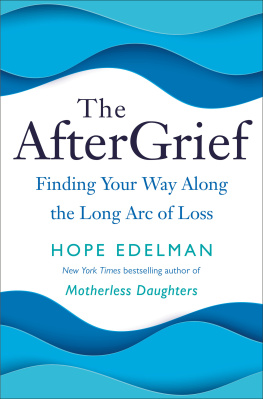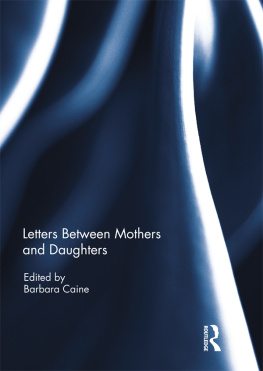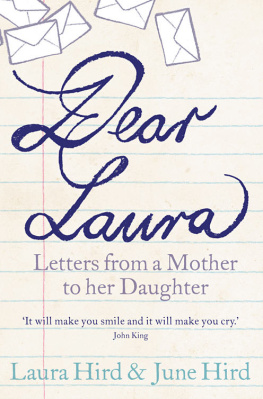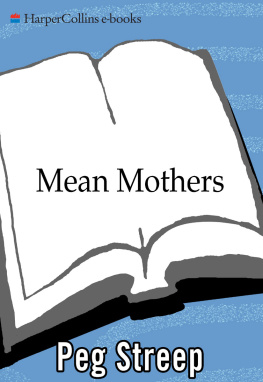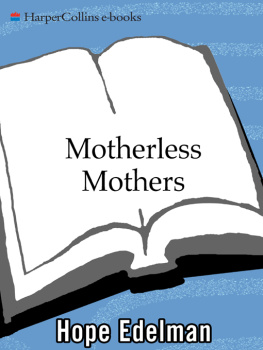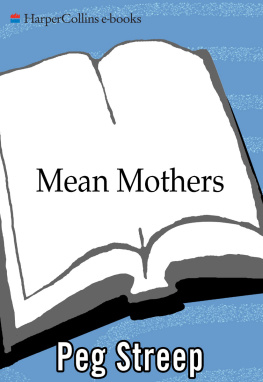How Does a Daughter Survive the Loss of a Mothers Love?
More than a decade after my mothers death, I still converse with her.
As my mother told me one day before she went into the hospital for the first time, You may not always hear me, but youll always feel my answer.
Id learned to express my love for her whenever I felt it. I didnt need to see my mothers body for closure.... I chose instead to live with the memories of my mother full of life, and not without it.
The closer I get to her age [at death], the clearer it becomes to me that we each were given our own paths to walk in life. Believing in this gives me huge amounts of freedom and joy.
OTHER BOOKS BY HOPE EDELMAN
Motherless Daughters
Motherless Mothers
Mother of My Mother
The Possibility of Everything
Boys Like That


Copyright 2014 by Hope Edelman
All rights reserved. No part of this publication may be reproduced, stored in a retrieval system, or transmitted, in any form or by any means, electronic, mechanical, photocopying, recording, or otherwise, without the prior written permission of the publisher. For information, address Da Capo Press, 44 Farnsworth Street, 3rd Floor, Boston, MA 02210
Designed by Jack Lenzo
Set in 12 point Garamond by the Perseus Books Group
Cataloging-in-Publication data for this book is available from the Library of Congress.
First Da Capo Press edition 2014
ISBN: 978-0-7382-1754-3 (e-book)
Published by Da Capo Press
A Member of the Perseus Books Group
www.dacapopress.com
Da Capo Press books are available at special discounts for bulk purchases in the U.S. by corporations, institutions, and other organizations. For more information, please contact the Special Markets Department at the Perseus Books Group, 2300 Chestnut Street, Suite 200, Philadelphia, PA, 19103, or call (800) 810-4145, ext. 5000, or e-mail .
10 9 8 7 6 5 4 3 2 1
For my Aunt Rosalie, who is deeply missed
Contents
To Elizabeth Kaplan, my agent, for twenty years of excellent advice and support; my editor Rene Sedliar and the team at Perseus, for believing in the enduring power of this book; Wendy Hudson, for invaluable assistance in all matters Internet and editorial; Belen Ricoy, for loving my daughters almost as much as I do; Hedgebrook womens writing retreat, for time and space and radical hospitality; Maya and Eden, for making every day a new adventure; and Uzi, for everything else and more: thank you. So much.
In the letters, e-mails, and phone calls I received after the publication of Motherless Daughters, many of the women whod read the book asked for more. They wanted more stories from other women whod lost their mothers, more information about the grieving process, and further assurance that their experiences were neither isolated nor unique. Hundreds of women sent me their personal stories of mother loss, and many of them generously agreed to participate in a subsequent book.
Letters from Motherless Daughters was compiled in 1995 to fulfill these requests. Even after its publication, the letters kept coming in, first via regular mail and then over the Internet. Nearly twenty years later, I still receive e-mails and Facebook messages every day from readers all over the world, many from teenage girls whose losses are recent and raw. This twentieth anniversary edition includes thirty-four of the original letters and nineteen new ones. That it is impossible to distinguish between past letters and new ones is testimony to the universal and timeless nature of grief.
The women whose letters appear in this book come from all over the United States as well as Canada, Australia, and the United Kingdom. They range in age from thirteen to seventy-eight, with an average age of thirty three. The letters have been edited for reasons of space, but I have retained their original language and syntax as often as possible. In exchange for the use of these letters, I have promised anonymity to their writers. All of the names that appear in this book are pseudonyms.
I will tell you about a girl.
Eighteen years old, and she was on a quest. Late at night in her universitys main library, she searched up and down the stacks. In the psychology aisles, the womens studies aisles, the sociology aisles, night after night. What was the title of the book she sought? She did not know. She knew only that it would be a book about girls without mothers and that it would help her understand herself. It would help explain why, more than a year after her mother had died of breast cancer, she couldnt talk about her mother or even hear her name without starting to weep.
Each night that winter she stepped back out of the library into the inky, freezing wind, wrapped her scarf around her face, and walked back to her dorm room. She was no more informed than shed been that afternoon. But shed made it through another day without a mother. That was something.
Some days were harder than others. Like Sundays, when the other girls lay on their beds, talking on their telephones to mothers back at home. And one particular Monday in May, when a group of her friends invited her to join them on a walk downtown to buy Mothers Day cards. The request felt like a knife in her gut. She made up a hasty excuse: she had a prior commitment. It wasnt a lie. She had important things to do. Places to go. A person she needed to become, and quickly, just in case everything was taken away too soon.
But other days were uneventful. Normal, even. She went to class. She joined a sorority. She rode the El train to a part-time job, learned to make pesto, met a boy who used the word love and meant it. Some days, she could almost believe she was just like the other girls, the ones with intact families, whose mothers called every Sunday.
The girl finished college, got a job, returned to graduate school. But at every new transition and at every setback, her mother was not there for her to call. Not there to say, Good job! or Dont worry, sweetie. Itll be okay. Sometimes this made her sadder than she ever thought possible. And sometimes it gave her the motivation she needed to work harder, do better, become that cheerleader and source of comfort for herself.
She never found the book she needed, not even after eight years of searching. So she started writing it herself. Other motherless women clamored to be interviewed. No one had ever asked them to share their stories before. Sure, they had books they could read about grief and mourning, psychology books about early parent loss, and memoirs by sons and daughters who told stories of loss, pain, and recovery. But most of these grief texts were about crisis management, not about long-term effects. None of them explained how you should feel four, seven, twelve years later. They didnt explain the impulse to stay connected to a dead mother or that it was all right to still have moments of sadness and hopelessness in between moments of joy.
Next page

